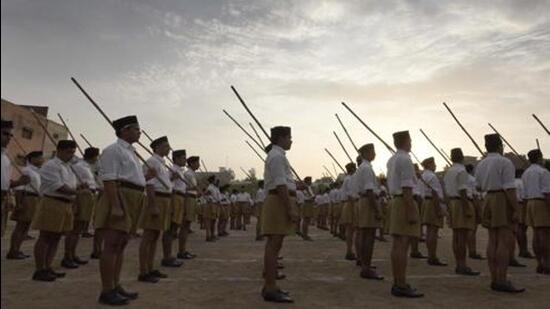
‘TOOK 50 YRS TO REALISE MISTAKE’: HC ON GOVT LIFTING BAN FOR STAFF AT RSS EVENTS
The Madhya Pradesh high court on Thursday condemned the long-standing ban on government employees participating in the activities of the Rashtriya Swayamsevak Sangh (RSS), underlining the flawed basis of the original office memorandums (OMs) that imposed this prohibition over five decades ago.
Emphasising the lack of empirical evidence and rational basis for a complete restriction on RSS that was lifted by the Narendra Modi- government on July 9 this year, a bench of justices SA Dharmadhikari and Gajendra Singh lamented that the organisation, which was several non-political wings too, remained out of bounds for government employees for more than five decades without any review or assessment of evidence.
“The court also laments the fact that it took almost five decades for the central government to realise its mistake; to acknowledge that an internationally renowned organisation like RSS was wrongly placed amongst the banned organisations of the country and that its removal therefrom is quintessential. Aspirations of many central government employees of serving the countries in many ways, therefore got diminished in these five decades because of this ban,” said the bench.
It directed the Department of Personnel and Training (DoPT) and the Ministry of Home Affairs (MHA) to ensure widespread publicity of the new order lifting the prohibition on RSS participation. The court mandated that the OM dated July 9, 2024, be displayed prominently on the official websites of these departments and transmitted to all central government departments and undertakings across India within 15 days of the judgment.
The controversy dates back to three OMs issued between 1966 and 1980, which prohibited central government employees from associating with RSS. The lifting of the ban sparked a war of words between the Opposition and the ruling Bharatiya Janata Party (BJP). While BJP leader Amit Malviya lauded the withdrawal of what he termed an “unconstitutional order”, Congress leader Jairam Ramesh and AIMIM MP Asaduddin Owaisi criticised the move. Sunil Ambekar, RSS’s publicity chief, on Monday said that the Congress government had baselessly banned government employees from participating in the activities of a “constructive organization like the Sangh”, to cater to its political interests.
A retired government employee knocked on the high court’s door challenging the Central Civil Service (Conduct) Rules based on the OMs that prohibited him from associating with RSS. While the case remained pending, the Union government informed the high court that the prohibition had been revoked through a fresh OM dated July 9, 2024.
Refusing to wrap up the proceedings in light of the new OM, the high court held that it was imperative to deliver a ruling “to ensure that any coveted voluntary organisation, working in public and national interest is not crucified again through executive instructions/ OMs at the whims and fancies of the government of the day, in the manner in which the RSS has been so treated for last almost 5 decades.”
The bench pointed out that the OM directives seemed to lack any substantial foundation, questioning the empirical basis of the original ban. It noted that the government had failed to provide any material, study or survey that justified its decision on either banning the organisation or a subsequent review that prompted it to revoke the ban.
“What was the empirical report, statistical survey, or material, that led the then government of the day to arrive at an objective satisfaction that involvement of Central Government employees with the RSS would precipitate communal feelings and communal bias in the whole community?” the court asked. “Perhaps there was never any material, study, survey, or report at the relevant point of time on the basis of which the ruling dispensation arrived at a satisfaction that involvement and engagement of central government employees even with the apolitical/non-political activities of RSS must be banned,” it held.
The court further highlighted that the ban, which impacted fundamental rights guaranteed under Article 19(1)(g) of the Constitution, was imposed arbitrarily. The judgment noted that the restrictions, prima facie, violated cherished freedoms under Article 19(1) and would have continued unabated if not for the institution of the writ petition.
“The central government cannot behave as ‘be all and above all’. The discretion to classify any organization as a ‘don’t join’ organization for central government employees must therefore be clearly informed by rules of reason, fair play, and justice, not according to subjective opinions of those in power,” it stated.
According to the judgment, voluntary membership of an organisation like RSS, for activities other than political in nature, like religious, social, philanthropic, educational cannot be proscribed through executive instructions. “They ought to have been done only through duly enacted law if the necessity was felt for doing so, preferably through amendments to the Conduct rules itself,” it held.
The court also emphasised that any future decisions to ban organizations like the RSS must be preceded by substantial evidence and a thorough review process. “Any such exercise of proposing and restoring its name back in the ‘don’t join’ list ever in future must be preceded by a profound thought process, intensive deliberations at the highest levels of the rule-making authority, backed by persuasive data, compelling evidence, and material,” it said.
Moreover, the judgment underscored the need to prevent arbitrary or whimsical bans, asserting that such decisions must be rooted in law and reason. “Decisions of the State must be informed by reason based on reasonable, relevant, and rational considerations and that it must act in public and national interest,” the court noted.
Ends
Read more news like this on HindustanTimes.com
2024-07-26T00:55:22Z dg43tfdfdgfd